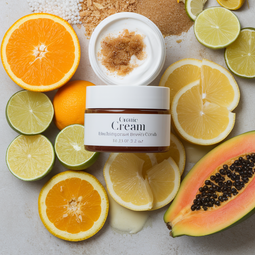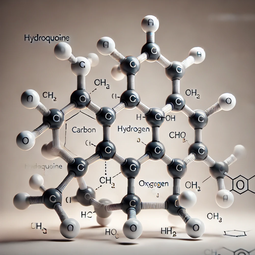Natural vs. Synthetic Skincare: What’s the Difference, and Which Is Right for You?
On
16/11/2024Reading time:
0 min
Summary:
In today’s skincare landscape, natural and synthetic ingredients often take center stage in product formulations, each with unique benefits and characteristics. Consumers looking for effective skincare may wonder about the differences between the two, and which type is best suited for their skin and values. Here’s a closer look at what defines natural and synthetic skincare, the pros and cons of each, and how to make an informed choice that works for your skin.

What Are Natural Ingredients in Skincare?
Natural ingredients are derived from plants, minerals, or animal sources and are minimally processed to retain their natural properties. Examples of natural skincare ingredients include aloe vera, coconut oil, jojoba oil, green tea extract, and essential oils. These ingredients are often featured in “clean beauty” formulations, which prioritize minimal processing and avoid synthetic additives, fragrances, or colors.
Pros of Natural Ingredients
Fewer Harsh Chemicals: Many natural ingredients avoid synthetic chemicals, such as artificial fragrances, parabens, and certain preservatives that can sometimes irritate sensitive skin.
Rich in Nutrients: Ingredients like botanical oils, fruit extracts, and herbal compounds are naturally rich in antioxidants, vitamins, and essential fatty acids, which can benefit skin health.
Eco-Friendly Options: Natural ingredients are often seen as more sustainable, especially when sourced responsibly. They are generally biodegradable and may have a smaller environmental footprint if harvested sustainably.
Appeals to Sensitive Skin: Some people find natural ingredients to be gentler and less likely to cause irritation than certain synthetic additives.
Cons of Natural Ingredients
Shorter Shelf Life: Because natural ingredients often lack synthetic preservatives, they may expire more quickly and require careful storage.
Variability in Quality: Natural ingredients can vary due to factors like climate and soil conditions, leading to inconsistencies in product efficacy and quality.
Potential for Allergies: Just because an ingredient is natural doesn’t mean it’s non-irritating. Essential oils, for example, can cause allergic reactions or sensitization in some individuals.
Less Stability in Formulation: Many natural ingredients are more sensitive to factors like light and air, which can affect product stability and efficacy over time.
What Are Synthetic Ingredients in Skincare?
Synthetic ingredients are created in a laboratory and are carefully engineered to be stable, effective, and safe for use on the skin. Common synthetic ingredients include retinoids, hyaluronic acid, peptides, and silicones. Synthetic ingredients often serve specific purposes, such as hydration, anti-aging, or acne treatment, and they allow formulators to control the ingredient’s purity and potency.
Pros of Synthetic Ingredients
Consistency and Stability: Laboratory-created ingredients can be more consistent in quality and effectiveness, as they aren’t affected by environmental factors. They’re often more stable, making them suitable for long-lasting formulations.
Targeted Efficacy: Synthetic ingredients can be designed to target specific skin concerns, such as wrinkles, acne, or hyperpigmentation. For example, retinoids and peptides have been widely studied for their proven anti-aging benefits.
Extended Shelf Life: Synthetic preservatives and other compounds help extend the shelf life of products, making them convenient and less likely to spoil quickly.
Hypoallergenic Options: Many synthetic ingredients are developed to be hypoallergenic and non-irritating, which can benefit people with sensitive skin, especially if they are allergic to certain natural ingredients.
Cons of Synthetic Ingredients
Environmental Impact: Some synthetic ingredients, like certain silicones and microplastics, may be slow to biodegrade, contributing to environmental concerns.
Potential Irritation from Additives: Some synthetic preservatives, fragrances, or dyes can irritate sensitive skin, especially for those with conditions like eczema or rosacea.
Concerns Over Safety Perception: Certain synthetic ingredients, such as parabens, sulfates, and phthalates, have been associated with potential health risks, though regulatory bodies generally consider them safe within certain limits.
Lack of Nutrient Complexity: Synthetic ingredients, while effective, might lack the complex nutrient profiles found in whole plant-based ingredients, which contain multiple antioxidants, vitamins, and minerals in a single extract.

Which Is Better: Natural or Synthetic?
There’s no clear winner between natural and synthetic skincare, as each type offers unique advantages. For many people, a balanced approach—using both natural and synthetic ingredients—can provide the best of both worlds.
Natural Skincare Is Ideal For:
Individuals with Sensitive Skin: If you have sensitive or allergy-prone skin, opting for natural formulations without synthetic fragrances or preservatives can help reduce irritation.
Eco-Conscious Consumers: Those concerned with environmental impact may prefer natural products, especially when they’re certified as organic or sustainably sourced.
Skin Health and Nutrient-Rich Care: Natural ingredients often deliver a range of nutrients in their most unprocessed forms, which may benefit those who prioritize a holistic approach to skincare.
Synthetic Skincare Is Ideal For:
Targeted Skin Treatments: If you’re looking to treat specific skin concerns, such as acne or aging, synthetic ingredients like retinoids or peptides offer scientifically-backed solutions with predictable results.
Long-Lasting Products: People who prefer low-maintenance routines and products that don’t spoil
Conclusion: A Balanced Approach to Skincare
When it comes to choosing between natural and synthetic skincare, the key is balance and personal preference. Natural ingredients provide nutrient-rich care and align with sustainability values, while synthetic ingredients deliver targeted, consistent results and longer shelf life. Many modern skincare brands are now embracing a hybrid approach, combining natural and synthetic ingredients to create products that are both effective and safe.
The choice ultimately depends on your skincare goals, values, and sensitivities. There’s no right or wrong answer, and many people find that a combination of both natural and synthetic ingredients works best for their unique skin needs. As always, consult a dermatologist if you have specific concerns, and remember that informed choices can help you create a skincare routine that supports both your skin health and personal values.


